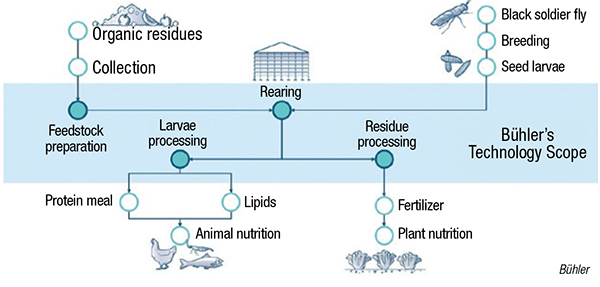Agronutris (Saint Orens de Gameville, France; www.agronutris.com) has selected Bühler AG (Uzwil, Switzerland; www.buhlergroup.com) as its process-solution provider for its first commercial-scale black-soldier-fly plant. Bühler will deliver a full-scope solution for the facility, which will be built in Rethel, France. The plant is planned to go into operation in 2023, and when operating at full capacity, will process up to 70,000 ton/yr of organic residues and produce high-quality protein for the aquaculture and pet-food markets.
Bühler’s scope for Agronutris will cover the entire supply chain (diagram). This includes feedstock preparation to provide safe, palatable and nourishing feed to the larvae and a fully automated larvae-growth system with sophisticated climate control. Bühler will also deliver the processing line to efficiently transform the grown larvae into protein meal and lipids with consistent quality, as well as the frass (excrement) handling system for a secure offtake of the rearing residues. Bühler will also be responsible for the entire automation and the timely project execution (engineering, procurement, manufacturing, supply, installation and commissioning).

The objective of the processing is to gently defat the larvae to get protein meals and lipids ready to use in pet food and animal-feed applications. After they have reached their harvesting size in the rearing area, the larvae are sent to the processing area of the plant. As a first step, the larvae are carefully sieved from the rearing residue. Then they are washed to remove any residual frass on the surface. A live-larvae storage solution, which can be added optionally to the process, allows the decoupling of processing from harvesting schedule, which leads to a high operational flexibility. Afterwards, the larvae are turned into a puree in a micro-cutter mill, which quickly inactivates the larvae and efficiently releases the lipids from the cells. After puree pasteurization in a heat exchanger, the lipids are separated in a decanter and further purified in a high-speed separator. Besides the lipids, the decanter step also results in a solid and stick water fraction. The stick water fraction is concentrated in an evaporator and then recombined with the solid fraction. Subsequently, the mixture is dried to achieve a shelf-stable, protein-meal product. The protein meal can be further ground in a mill to the final particle size, before it is packaged in the desired lot size.